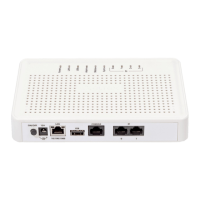SMG digital gateway 71
Enable redirection (302) processing—when checked, the gateway is allowed to perform
redirection upon receipt of reply 302 from this interface. When unchecked and reply 302 is
received, the gateway will reject the call and perform the redirection.
Redirection server direction—this option is available when reply 302 processing is enabled (the
Enable redirection (302) parameter). This enables redirection of the call, which was sent using a
public address, to the subscriber's private address received in reply 302 without numbering
schedule routing. The call is routed directly to the address specified in the "contact" header of
reply 302 received from the redirection server.
Enable REFER processing—a REFER request is sent by the communicating gateway to enable the
Call Transfer service. When checked, the gateway is allowed to process REFER requests received
from this interface. When unchecked, the gateway clears back the call upon receipt of a REFER
request and does not provide the Call Transfer service.
Reliable provisional responses (1xx)—when checked, the INVITE request and 1хх class provisional
responses will contain the require: 100rel option, which requires assured confirmation of
provisional responses.
– off—reliable delivery of provisional responses is disabled.
– support—the INVITE request and 1хх class provisional responses will contain the support:
100rel option.
– require—the INVITE request and 1хх class provisional responses will contain the require:
100rel option, which requires assured confirmation of provisional responses.
The SIP protocol defines two types of responses to connection initiating requests (INVITE)—
provisional and final. 2хх, 3хх, 4хх, 5хх and 6хх-class responses are final, their transfer is reliable
and confirmed by the ACK message. 1хх-class responses, except for the "100 Trying" response, are
provisional and do not have a confirmation (rfc3261). These responses contain information on the
current INVITE request processing step; in SIP-T/SIP-I protocols, SS-7 messages are encapsulated
into 1xx class responses, therefore the loss of these responses is unacceptable. Utilisation of
reliable provisional responses is also realised in the SIP protocol (rfc3262) and is defined by the
"100rel" tag in the initiating request. In this case, provisional responses are confirmed by a PRACK
message.
DSCP for signalling—a service type (DSCP) for SIP signalling traffic.
Remote name in contact header - insert displayed name in Contact header.
SIP Session Timers (RFC 4028)
Enable—when checked, enables support of SIP session timers (RFC 4028). A session is renewed by
re-INVITE requests sent during the session.
Session Expires—a period of time in seconds before a forced session termination if the session is
not renewed in time (from 90 to 64,800 seconds; 1,800 seconds is recommended).
Min SE (Minimum session expiration)—the minimal time interval for connection health checks
(from 90 to 32,000 seconds). This value should not exceed the Sessions Expires forced termination
timeout.
Refresher side—defines the party to renew the session (client (uac)—client (caller) party, server
(uas)—server (callee) party).

